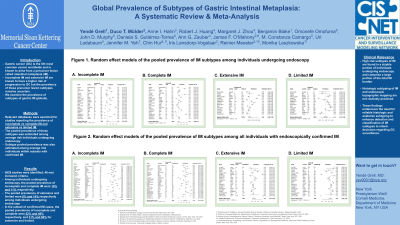Tuesday Poster Session
Category: Stomach
P5039 - Global Prevalence of Subtypes of Gastric Intestinal Metaplasia: A Systematic Review & Meta-Analysis
Tuesday, October 29, 2024
10:30 AM - 4:00 PM ET
Location: Exhibit Hall E

Has Audio

Yende Grell, MD
New York-Presbyterian / Weill Cornell Medical Center
New York, NY
Presenting Author(s)
Yende Grell, MD1, Duco Mulder, Msc2, Anne Hahn, MPH3, Robert Huang, MD4, Margaret Zhou, MD4, Benjamin Blake, MD5, Omonefe Omofuma, PhD6, John Murphy, PhD7, Daniela Gutiérrez-Torres, MS7, Ann G.. Zauber, PhD3, James O’Mahony, PhD8, Maria Constanza Camargo, PhD7, Uri Ladabaum, MD9, Jennifer Yeh, PhD10, Chin Hur, MD, MPH11, Iris Lansdorp-Vogelaar, PhD12, Reinier Meester, PhD13, Monika Laszkowska, MD, MS3
1New York-Presbyterian / Weill Cornell Medical Center, New York, NY; 2Erasmus School of Health Policy & Management, Rotterdam, Zuid-Holland, Netherlands; 3Memorial Sloan Kettering Cancer Center, New York, NY; 4Stanford University School of Medicine, Stanford, CA; 5New York-Presbyterian Hospital/Weill Cornell Medical Center, New York, NY; 6National Institutes of Health, Rockville, MD; 7National Institutes of Health, Bethesda, MD; 8University College Dublin, Dublin, Dublin, Ireland; 9Stanford University School of Medicine, Redwood City, CA; 10Boston Children's Hospital, Boston, MA; 11Columbia University Irving Medical Center, New York, NY; 12Erasmus University Medical Center, Rotterdam, Zuid-Holland, Netherlands; 13Freenome, South San Francisco, CA
Introduction: Gastric cancer (GC) is the 5th most common cancer worldwide and is known to arise from a precursor lesion called gastric intestinal metaplasia (IM). IM subtypes, such as incomplete IM and extensive IM, are known to have a higher risk of progression to GC but the prevalence of these precursor subtypes globally remains uncertain. We conducted a systematic review and meta-analysis to examine the prevalence of subtypes of gastric IM globally.
Methods: Databases including EMBASE, PubMed, Cochrane, and Web of Science were searched for publications which reported the prevalence of histologically confirmed subtypes of gastric IM, including limited IM (antrum only) vs. extensive IM (extending to the corpus) as well as complete IM (resembling small intestinal epithelium) vs. incomplete IM (resembling colonic epithelium). Studies of average risk individuals undergoing endoscopy with biopsy for screening or symptomatic evaluation were included. Random-effects meta-analysis models were used to estimate the pooled prevalence and 95% confidence intervals (CI) of IM subtypes among individuals undergoing endoscopy, and within the subset with confirmed IM.
Results: Among the 5829 articles that underwent review, 35 studies met inclusion criteria. First, studies reporting on prevalence of extensive vs. limited IM were evaluated. The global pooled prevalence of extensive IM in individuals undergoing endoscopy was 6% (95% CI 4-8%) and of limited IM was 15% (95% CI 12-18%). Among the subset of individuals with IM, extensive IM comprised 27% (95% CI 22-32%) of cases and limited IM comprised 73% of cases (95% CI 68-78%; Figure 1A). Next, studies reporting on prevalence of incomplete vs. complete IM were evaluated. The pooled overall prevalence of incomplete IM among those undergoing endoscopy was 11% (95% CI 9-14%) and of complete IM was 13% (95% CI 9-17%). Among the subset of individuals with IM, 46% (95% CI 32-60%) of the cases had incomplete IM and 54% (95% CI 40-68%; Figure 1B) had complete IM.
Discussion: High risk subtypes of IM are found in a sizable portion of individuals undergoing endoscopy and comprise a large portion of the total IM burden. Given the increased risk of progression to GC among individuals with extensive and incomplete IM, these findings underscore the need for reliable histologic subtyping to enhance detection and classification of IM to inform decisions regarding GC surveillance.

Disclosures:
Yende Grell, MD1, Duco Mulder, Msc2, Anne Hahn, MPH3, Robert Huang, MD4, Margaret Zhou, MD4, Benjamin Blake, MD5, Omonefe Omofuma, PhD6, John Murphy, PhD7, Daniela Gutiérrez-Torres, MS7, Ann G.. Zauber, PhD3, James O’Mahony, PhD8, Maria Constanza Camargo, PhD7, Uri Ladabaum, MD9, Jennifer Yeh, PhD10, Chin Hur, MD, MPH11, Iris Lansdorp-Vogelaar, PhD12, Reinier Meester, PhD13, Monika Laszkowska, MD, MS3. P5039 - Global Prevalence of Subtypes of Gastric Intestinal Metaplasia: A Systematic Review & Meta-Analysis, ACG 2024 Annual Scientific Meeting Abstracts. Philadelphia, PA: American College of Gastroenterology.
1New York-Presbyterian / Weill Cornell Medical Center, New York, NY; 2Erasmus School of Health Policy & Management, Rotterdam, Zuid-Holland, Netherlands; 3Memorial Sloan Kettering Cancer Center, New York, NY; 4Stanford University School of Medicine, Stanford, CA; 5New York-Presbyterian Hospital/Weill Cornell Medical Center, New York, NY; 6National Institutes of Health, Rockville, MD; 7National Institutes of Health, Bethesda, MD; 8University College Dublin, Dublin, Dublin, Ireland; 9Stanford University School of Medicine, Redwood City, CA; 10Boston Children's Hospital, Boston, MA; 11Columbia University Irving Medical Center, New York, NY; 12Erasmus University Medical Center, Rotterdam, Zuid-Holland, Netherlands; 13Freenome, South San Francisco, CA
Introduction: Gastric cancer (GC) is the 5th most common cancer worldwide and is known to arise from a precursor lesion called gastric intestinal metaplasia (IM). IM subtypes, such as incomplete IM and extensive IM, are known to have a higher risk of progression to GC but the prevalence of these precursor subtypes globally remains uncertain. We conducted a systematic review and meta-analysis to examine the prevalence of subtypes of gastric IM globally.
Methods: Databases including EMBASE, PubMed, Cochrane, and Web of Science were searched for publications which reported the prevalence of histologically confirmed subtypes of gastric IM, including limited IM (antrum only) vs. extensive IM (extending to the corpus) as well as complete IM (resembling small intestinal epithelium) vs. incomplete IM (resembling colonic epithelium). Studies of average risk individuals undergoing endoscopy with biopsy for screening or symptomatic evaluation were included. Random-effects meta-analysis models were used to estimate the pooled prevalence and 95% confidence intervals (CI) of IM subtypes among individuals undergoing endoscopy, and within the subset with confirmed IM.
Results: Among the 5829 articles that underwent review, 35 studies met inclusion criteria. First, studies reporting on prevalence of extensive vs. limited IM were evaluated. The global pooled prevalence of extensive IM in individuals undergoing endoscopy was 6% (95% CI 4-8%) and of limited IM was 15% (95% CI 12-18%). Among the subset of individuals with IM, extensive IM comprised 27% (95% CI 22-32%) of cases and limited IM comprised 73% of cases (95% CI 68-78%; Figure 1A). Next, studies reporting on prevalence of incomplete vs. complete IM were evaluated. The pooled overall prevalence of incomplete IM among those undergoing endoscopy was 11% (95% CI 9-14%) and of complete IM was 13% (95% CI 9-17%). Among the subset of individuals with IM, 46% (95% CI 32-60%) of the cases had incomplete IM and 54% (95% CI 40-68%; Figure 1B) had complete IM.
Discussion: High risk subtypes of IM are found in a sizable portion of individuals undergoing endoscopy and comprise a large portion of the total IM burden. Given the increased risk of progression to GC among individuals with extensive and incomplete IM, these findings underscore the need for reliable histologic subtyping to enhance detection and classification of IM to inform decisions regarding GC surveillance.

Figure: Figure 1. Random effect models of the pooled prevalence subtypes of intestinal metaplasia (IM) among all individuals with endoscopically confirmed IM, including extensive IM and limited (non-extensive) IM (A) and incomplete IM and complete IM (B).
Disclosures:
Yende Grell indicated no relevant financial relationships.
Duco Mulder indicated no relevant financial relationships.
Anne Hahn indicated no relevant financial relationships.
Robert Huang indicated no relevant financial relationships.
Margaret Zhou indicated no relevant financial relationships.
Benjamin Blake indicated no relevant financial relationships.
Omonefe Omofuma indicated no relevant financial relationships.
John Murphy indicated no relevant financial relationships.
Daniela Gutiérrez-Torres indicated no relevant financial relationships.
Ann Zauber indicated no relevant financial relationships.
James O’Mahony indicated no relevant financial relationships.
Maria Constanza Camargo indicated no relevant financial relationships.
Uri Ladabaum: ChekCap – Consultant. Clinical Genomics – Consultant. Freenome – Consultant. Guardant Health – Consultant. Kohler Ventures – Advisor or Review Panel Member. Lean Medical – Advisor or Review Panel Member. Medtronic – Consultant. Universal Dx – Advisor or Review Panel Member. Vivante Health – Advisor or Review Panel Member.
Jennifer Yeh indicated no relevant financial relationships.
Chin Hur indicated no relevant financial relationships.
Iris Lansdorp-Vogelaar indicated no relevant financial relationships.
Reinier Meester: Freenome Holdings Inc – Employee.
Monika Laszkowska: AI Medical Service Inc – Grant/Research Support.
Yende Grell, MD1, Duco Mulder, Msc2, Anne Hahn, MPH3, Robert Huang, MD4, Margaret Zhou, MD4, Benjamin Blake, MD5, Omonefe Omofuma, PhD6, John Murphy, PhD7, Daniela Gutiérrez-Torres, MS7, Ann G.. Zauber, PhD3, James O’Mahony, PhD8, Maria Constanza Camargo, PhD7, Uri Ladabaum, MD9, Jennifer Yeh, PhD10, Chin Hur, MD, MPH11, Iris Lansdorp-Vogelaar, PhD12, Reinier Meester, PhD13, Monika Laszkowska, MD, MS3. P5039 - Global Prevalence of Subtypes of Gastric Intestinal Metaplasia: A Systematic Review & Meta-Analysis, ACG 2024 Annual Scientific Meeting Abstracts. Philadelphia, PA: American College of Gastroenterology.
